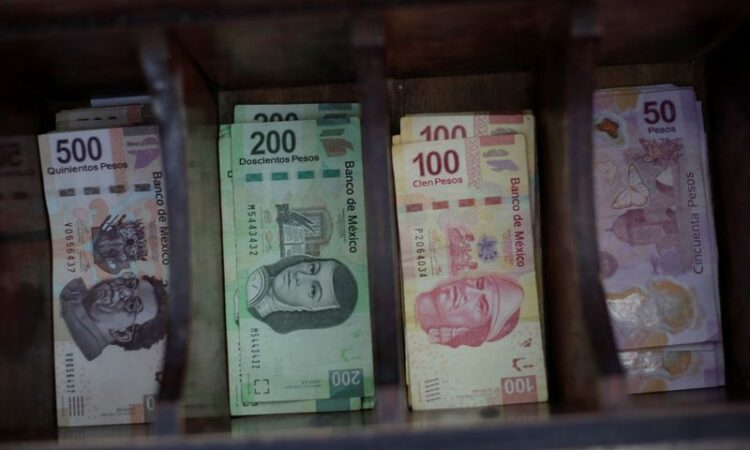
BUENOS AIRES (Reuters) – An expected fall in Mexico’s peso will likely be cushioned by its favorable interest rate spread, although there is a wide range of views on the currency’s prospects over the coming year, a Reuters poll of foreign exchange strategists showed.
This week the peso extended a winning run that started in the fourth quarter, reaching its highest levels in more than seven years after the central bank signalled it would have to stay on hold for longer to bring down inflation.
The median estimate of 19 FX specialists polled June 1-6 for the peso’s value in 12 months was 18.60 per U.S. dollar, implying a 6.5% loss from 17.39 on Tuesday, but still a strong forecast and 3.5% firmer than last month’s one-year call.
It was also the best projection for the 12-month period in the survey’s recent history, reflecting positive sentiment towards the big margin between Mexico’s benchmark rate, currently at 11.25%, and the U.S fed funds rate range of 5.00%-5.25%.
However, there are increasingly divergent views on the outlook for the currency, as the gap between the highest and lowest forecasts widened further, to 20.85-16.58 pesos this month from 20.73-17.10 in May.
Optimists keep raising their bets on Mexico’s elevated rates, while skeptics fear possible setbacks from strategies overlooking the country’s high dependence on unimpressive U.S. growth.
“LatAm FX has been generally trading as in normal times, exhibiting a low volatility. However, a risk-off shock could sharply deteriorate carry-to-risk,” BofA analysts, who had one of the weakest forecasts, wrote in a report last week.
“This is particularly stark for MXN, whose volatility is the most subdued despite its arguably greater sensitivity to U.S.-driven risk-off shocks.”
In Brazil, the real is set to fall 4.5% in one year to 5.14 per U.S. dollar from 4.91 this week. Yet, the consensus estimate was the same as in the last poll, showing little change in investor perceptions.
The currency’s relative stability is rooted in a general view the central bank will soon be able to orchestrate a smooth policy easing cycle that will satisfy both anxious financial markets and a government bent on reigniting the economy.
Year-to-date, the Mexican peso has risen 12%, making it a darling of currency dealers. The real is up 7.7%, confounding detractors who saw it crashing early on in President Luiz Inacio Lula da Silva’s government.
(For other stories from the June Reuters foreign exchange poll:
(Reporting and polling by Gabriel Burin in Buenos Aires; additional polling by Anitta Sunil and Aditi Verma in Bengaluru; Editing by Jonathan Cable, Ross Finley and Sharon Singleton)
By Gabriel Burin



